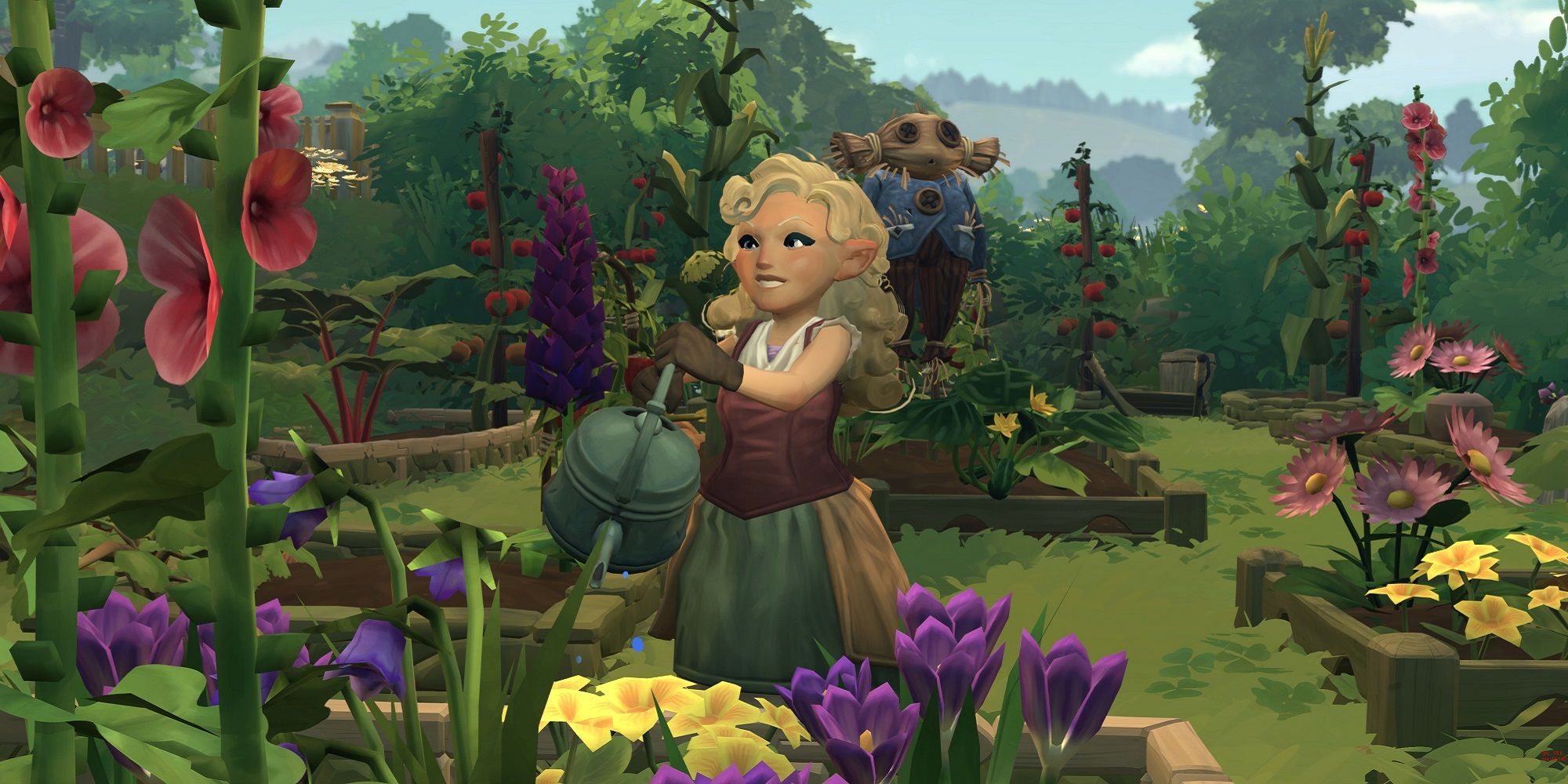Tales Of The Shire Trailer Shows That Hobbit Stardew Valley Makes The Perfect Lord Of The Rings Game

Summary
- Adaptations of Tolkien's work are varied, but very often focus on fighting.
- Tales of the Shire focuses on the peaceful life of Hobbits, with gameplay centred on cooking, gardening, and building relationships.
- The game understands that Tolkien adaptations should not be about war.
Fans of the Lord of the Rings are incredibly lucky, and I’m lucky enough to count myself among them. As well as a wealth of deep, beautiful prose from Tolkien himself, we’re constantly treated to new adaptations which we can dive into or ignore as we wish.
I know plenty of fans who love to drink up every new release – Tales of the Shire included – like a delicious cup of Ent-draught and others who shun them all in favour of the purity of the original text. That’s the beauty of adaptations, though – you can take them or leave them and still have your interpretation of the original text in your heart.
Of course, the adaptations are a mixed bag. On the one hand, you’ve got games like Shadow of Mordor and Shadow of War, which are excellent games with horrible lore implications that directly contradict Tolkien’s writing. On the other, you’ve got Gollum, which is a terrible, terrible game but fits neatly into the book timeline and has no major anti-Tolkienism.
Somewhere in the middle are myriad other adaptations, like The Rings of Power, which has issues with its writing but is more lore-accurate than Peter Jackson’s trilogy, which in turn has better writing and is more widely beloved (largely due to the fact that it wasn’t pulled into a manufactured culture war). Where Tales of the Shire will fall on this arbitrary scale remains to be seen, but the gameplay trailer suggests to me that the first game from Weta Workshop’s studio deeply understands the nature of Tolkien.
Yes, it’s that Weta Workshop who did the practical effects for Peter Jackson’s Lord of the Rings trilogy, District 9, Thor: Ragnarok, M3GAN, Cocaine Bear, and countless other movies.
The first trailer for Tales of the Shire presents a beautiful representation of the titular Hobbit county. I didn’t expect Weta’s depiction to lean so far away from the ‘00s trilogy due to the apparent connections, but the stylised art is so far removed from Peter Jackson and realism that it projects the perfect idyllicism of Tolkien’s Hobbit home.
Tales of the Shire’ trailer reinforces its own cosiness. This is not a game about fighting battles, winning wars, or defeating evil. This is a game about living your best life, tending your garden, and cooking up some delicious grub before returning home to your circular front door. And this, in and of itself, is the most inherently Tolkien premise a game could possibly have.
Tolkien was a man who would offer the most vague character descriptions, who would have his protagonist get knocked out so he didn’t have to describe the climatic battle at the end of The Hobbit, who would skip over any and all action in favour of spending a paragraph describing a single tree. He was a man who loved nature, deeply, and no game has captured that. Until now.
Lord of the Rings games have been intent on capturing the book’s epic moments that they forgo what really makes Tolkien Tolkien. Battle for Middle-earth 2 was brilliant, but the entirety of The Lord of the Rings carries an anti-war message that the game completely bypasses. The same goes for the Shadow games and even, to some extent, The Lord of the Rings Online. I’d go as far as to say that nearly every Lord of the Rings game made to date has relied on combat to make it exciting. If Battle for Middle-earth 2 is filling in the gaps in Tolkien’s prose where armies should wage war, Tales of the Shire is focusing on the lengthy descriptions of the old oaks in the Shire.
“The world is indeed full of peril, and in it there are many dark places; but still there is much that is fair, and though in all lands love is now mingled with grief, it grows perhaps the greater.” – Haldir, The Fellowship of the Ring
Tales of the Shire accurately assessed that there was a gap in the market for a Shire-based Stardew Valley-esque cosy game, but its execution already looks to be excellent. Aside from the stunning visual design, the music evokes a calm comfort while clearly paying homage to Howard Shore’s excellent work.
CloseThere’s still not much gameplay to go on, but we clearly see cooking mechanics as your little Hobbit heads to the pantry to entertain guests with the most delectable grub you can summon. Whether you boil, mash, or stick ingredients in stews, this promises to be a core part of the game, and for good reason. Hobbits are particular about their food, proud and hungry creatures in equal measure.
We also see home decoration and gardening systems, which are key to the life sim genre. There’s a day/night cycle and Bywater changes through the seasons, which will be a feast for the eyes as you tend your crops (which change depending on the time of year). There’s fishing and foraging, trading and fostering relationships. I just hope we get some smoke ring customisation in a pipe-smoking minigame.
Lead Features Editor Jade King also hopes there is a mechanic where Sam and Frodo can kiss. If they aren’t in the game, she will find and/or make a mod.
It’s unclear when in the timeline of Middle-earth Tales of the Shire is set, but it’s clearly a time of peace. The trailer only has one familiar face – Gandalf the Grey is resplendent in his big, blue hat. The press release tells us that we’ll meet iconic characters (note the plural) and familiar Hobbit families, so expect Tooks (maybe Bullroarer?) and Sackville-Bagginses.
Gandalf’s appearance tells us that it’s definitely set before the events of the Lord of the Rings, but the wizard was a familiar face in the Shire for decades prior to the events of Tolkien’s book. I wonder if we’ll see Bilbo as a child, including a firework sequence to reference the adventurous Hobbit’s childhood memories mentioned in The Hobbit.
Whenever it’s set, Tales of the Shire looks wonderful. I’m so glad that Weta chose such a distinctive art style to bring something new to the wide world of Lord of the Rings adaptations, but I’m most happy that the game seems to understand the source material implicitly. The Lord of the Rings is about far more than just war, and it’s taken far too long for games to understand that.
Next: Author David Day On Tolkien, The Rings Of Power, And Being Banned From The Tolkien Society













